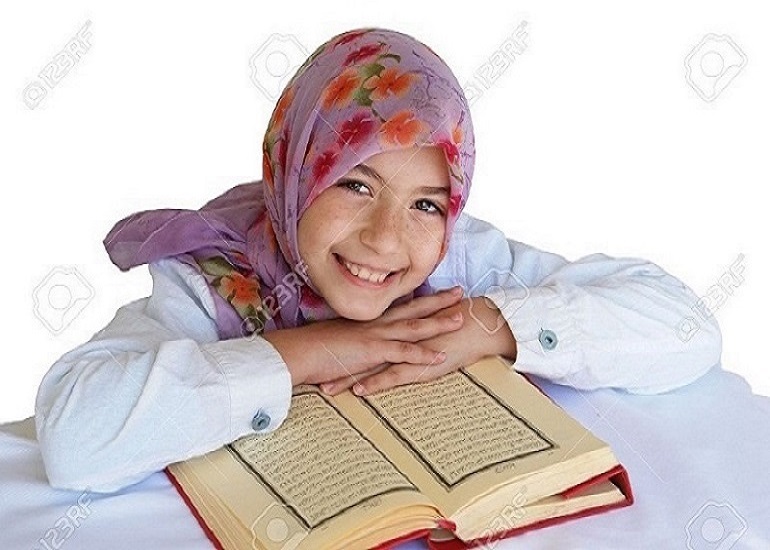Islam has introduced hijab as part of the decency and modesty in interaction between members of the opposite sex. Verse 59 of chapter 33 of the holy Quran gives a very good reason; it says,
“This is more appropriate so that they may be known [as Muslim women] and thus not be harassed [or molested].”

One of the many questions that have been asked is why does Islam make hijab mandatory for women? Islam has introduced hijab as part of the decency and modesty in interaction between members of the opposite sex. Verse 59 of chapter 33 of the holy Quran gives a very good reason; it says,
“This is more appropriate so that they may be known [as Muslim women] and thus not be harassed [or molested].”[1]
Many men, whether they confess it or not, are slaves of lust and desire.
• Hijab protects women from such men; it symbolizes that she has been sanctified to one man only and is off-limit to all others.
• Hijab contributes to the stability and preservation of marriage and family by eliminating the chances of extramarital affairs.
• Finally, it compels men to focus on the real personality of the woman and de-emphasizes her physical beauty. It puts the woman in control of strangers’ reaction to her.
Hijab, a symbol of oppression???
Feminists and the Western media often portray the hijab as a symbol of oppression and slavery of women. This sexist angle of viewing the hijab reflects the influence of Western feminists who are subconsciously reacting to the Judea-Christian concept of veil –– “the symbol of woman’s subjection to her husband”.[2]
I am surprised at the society which shows tolerance towards those who would like to go around topless but finds it difficult to tolerate a lady who by her own choice wants to observe hijab!
Naheed Mustafa, a Canadian Muslim says,
“In the Western world, the hijab has come to symbolize either forced silence or radical, unconscionable militancy. Actually, it’s neither. It is simply a woman’s assertion that judgment of her physical person is to play no role whatsoever in social interaction. Wearing the hijab has given me the freedom from constant attention to my physical self. Because my appearance is not subjected to scrutiny, my beauty, or perhaps lack of it, has been removed from the realm of what can legitimately be discussed.”[3]
Hijab is not a symbol of oppression. Women are oppressed because of socio-economic reasons even in countries where women have never heard about hijab. On the contrary, the practice of displaying pictures of almost naked women in the commercials, billboards, and in the entertainment industry in the west is a true symbol of oppression.
Does Hijab prevent a woman from participating in the affairs of society?
Neither does the hijab prevent a woman from acquiring knowledge or from contributing to the betterment of human society. Historically women have also greatly contributed to Islam,
Lady Khadijah, the first wife of the Prophet, played a significant role in the early history of Islam. A successful businesswoman in her own right, she was the first person to accept the message of Prophet Muhammad (s.a.w.). Her acceptance and faith were a great source of emotional support for the Prophet. She stood by her husband in the difficult days of early Islam, and spent her wealth for the promotion of the new religion.
The first Muslim person to be martyred in Muslim history was a woman by the name of Sumayya, the wife of Yasir and the mother of ‘Ammar. She was killed along with her husband for refusing to renounce Islam.
Lady Fatimatu ’z-Zahra’, the daughter of Prophet Muhammad, was a beacon of light and a source of guidance for the women of her time. She faithfully stood by her husband, Imam ‘Ali, in his struggle for his right of caliphate, and strongly protested against the first violation of the right of inheritance for daughters in Islam.
One of the most important events in the early history of Islam was the event of Karbala, which was a protest led by Imam Husayn against the tyranny of Yazid. In that protest, the soldiers of Yazid massacred Husayn and about seventy-two of his supporters. It was Husayn’s sister, Zaynab, who continued the social protest and was very influential in bringing about the awakening among the people to stand up against the tyranny of the rulers. Zaynab greatly contributed to the factors that eventually brought about the downfall of the Umayyads.
Notes:
[1] يَا أَيُّهَا النَّبِيُّ قُل لِّأَزْوَاجِكَ وَبَنَاتِكَ وَنِسَاءِ الْمُؤْمِنِينَ يُدْنِينَ عَلَيْهِنَّ مِن جَلَابِيبِهِنَّ ذَٰلِكَ أَدْنَىٰ أَن يُعْرَفْنَ فَلَا يُؤْذَيْنَ وَكَانَ اللَّـهُ غَفُورًا رَّحِيمًا
[2] See Aid to Bible Understanding, p. 468.
For the Biblical Christian perspective, see what St. Paul says: “But I would have you know, that the head of every man is Christ; and the head of the woman is the man; and the head of Christ is God. Every man praying or prophesying, having his head covered, dishonoureth his head. But every woman that prayeth or prophesieth with her head uncovered dishonoureth her head…Judge in yourselves: is it comely that a woman pray unto God uncovered?” (1 Corinthians 11:3-5, 13) In simple English, it means that if a man keeps his head covered in prayer, then he is disrespecting Christ; and if a woman keeps her head uncovered in prayer, then she is disrespecting her man. For Biblical Jewish concept, see Genesis 24:65.
[3] Mustafa, “My Body Is My Own Business,” Globe & Mail, 29th June 1993.



